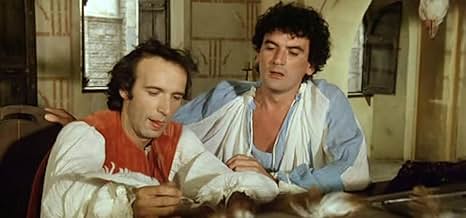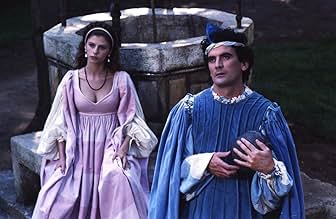AVALIAÇÃO DA IMDb
7,6/10
7,6 mil
SUA AVALIAÇÃO
Nos anos 80, dois amigos acordam misteriosamente no século XV e tentam desajeitadamente se misturar com a sociedade da época.Nos anos 80, dois amigos acordam misteriosamente no século XV e tentam desajeitadamente se misturar com a sociedade da época.Nos anos 80, dois amigos acordam misteriosamente no século XV e tentam desajeitadamente se misturar com a sociedade da época.
- Direção
- Roteiristas
- Artistas
- Prêmios
- 1 indicação no total
Avaliações em destaque
10pneruda
One of the best comedies ever done in the film history. Benigni and Troisi a couple that can hardly be repeated. Money doesnt necessarily make great films...and great films do not always need loads of money. This is a great example.
10p13r0
Two actors at their best (Roberto Benigni before he became big-headed after the world wide fame and the late lamented Massimo Troisi) playing a strange story, where these two young modern men wake up in 1492 after spending a night out because their car broke down.
Settled in the italian reinassance, pretty well depicted despite the low budget used, the movie is substantially a collection of sketches based on the struggles that the two men must fight against the different lifestyle, with some secondary stories based on historical personages lived in that time (Savonarola, Columbus, Da Vinci). This is one of the most beloved italian movie of all the times, and everybody saw this movie can remember all of the most famous dialogues (Vitellozzo after the death of his brother, the "remember that you shall die!" speech, the scene at the customs, and many others) by hearth, as they were funny and innovative.
Directed with a very slow rhythm, that adds a quite poetic touch to the story, this movie must be considered as a small masterpiece, a comedy unique of its kind. Comparing this with one of the later italian comedy should be done to understand the meaning of the term "good taste".
Unluckily, anybody without a very fluent italian can't completely enjoy this movie, because a big part of the funny side of this movie follows from the two heavy accents of the two main actors, mainly the one of Troisi.
Settled in the italian reinassance, pretty well depicted despite the low budget used, the movie is substantially a collection of sketches based on the struggles that the two men must fight against the different lifestyle, with some secondary stories based on historical personages lived in that time (Savonarola, Columbus, Da Vinci). This is one of the most beloved italian movie of all the times, and everybody saw this movie can remember all of the most famous dialogues (Vitellozzo after the death of his brother, the "remember that you shall die!" speech, the scene at the customs, and many others) by hearth, as they were funny and innovative.
Directed with a very slow rhythm, that adds a quite poetic touch to the story, this movie must be considered as a small masterpiece, a comedy unique of its kind. Comparing this with one of the later italian comedy should be done to understand the meaning of the term "good taste".
Unluckily, anybody without a very fluent italian can't completely enjoy this movie, because a big part of the funny side of this movie follows from the two heavy accents of the two main actors, mainly the one of Troisi.
10AleGenoa
Sadly, the only occasion we had to see together two of the best italian actors of the century: Benigni and Troisi. Anyway, it's a comedy: there's nothing else to do, but laugh.
"Non ci resta che piangere" is definitely a piece of art, directed by two of the most important Italian comedy writers: Benigni and Troisi. This is the work of a Napolitan and a Tuscan comic put together to make a film that'll make you laugh from its start and if you start, you'll never stop.
The plot is very simple: Mario and Saverio, a teacher and a janitor in an elementary school, find them in the year 1492 and it is the origin of all the funny situations you'll find in the movie.
The language used by Mario and Saverio is Italian, but Mario uses a typical Naples accent and Saverio it's using his Tuscan influence, so the language they use is crucial to the final meaning of the movie.
In the original version there was an additional scene, that the directors had to cut off when publishing the movie, despite this the movie is still very funny, and is its freshness, its lack of bad words what makes it a good comedy and a good film.
Ending, I think this movie is one of the best ever produced in Italy, but unfortunately, due to its dialectal language and the direct speech it can't be translated to other languages.
The plot is very simple: Mario and Saverio, a teacher and a janitor in an elementary school, find them in the year 1492 and it is the origin of all the funny situations you'll find in the movie.
The language used by Mario and Saverio is Italian, but Mario uses a typical Naples accent and Saverio it's using his Tuscan influence, so the language they use is crucial to the final meaning of the movie.
In the original version there was an additional scene, that the directors had to cut off when publishing the movie, despite this the movie is still very funny, and is its freshness, its lack of bad words what makes it a good comedy and a good film.
Ending, I think this movie is one of the best ever produced in Italy, but unfortunately, due to its dialectal language and the direct speech it can't be translated to other languages.
I like the Italians, most of all, but I do not like Massimo Troisi and Roberto Benigni, for me are the most annoying actors ever. Troisi, you do not understand what he says, in all the films he speaks in a kind of dialect that only he understands. In all the movies is the same, boring at the top. You got to have a great deal of steel patience and great love for cinema to watch this movie in its entirety. Troisi and Benigni, who are also directing, are not genius and are not funny at all.
Você sabia?
- CuriosidadesThe screenplay is the main guideline for the film but many dialogues were improvised by Troisi and Benigni.
- Citações
[last lines]
Saverio: Look! A train! I told you we would return to the present!
Mario: I'm not marrying Gabriellina!
Saverio: Oh yes you are!
Leonardo da Vinci: Engineers! TRAIN!
Leonardo da Vinci: For God's sake! 33%... 33%... and 33%...
[cut to a shot of the train and freeze as the film ends]
- ConexõesEdited into Bellissimo: Immagini del cinema italiano (1985)
- Trilhas sonorasNel blu dipinto di blu
Written by Domenico Modugno and Franco Migliacci
Principais escolhas
Faça login para avaliar e ver a lista de recomendações personalizadas
- How long is Nothing Left to Do but Cry?Fornecido pela Alexa
Detalhes
- Data de lançamento
- País de origem
- Idiomas
- Também conhecido como
- Nothing Left to Do but Cry
- Locações de filme
- Empresas de produção
- Consulte mais créditos da empresa na IMDbPro
Contribua para esta página
Sugerir uma alteração ou adicionar conteúdo ausente
























